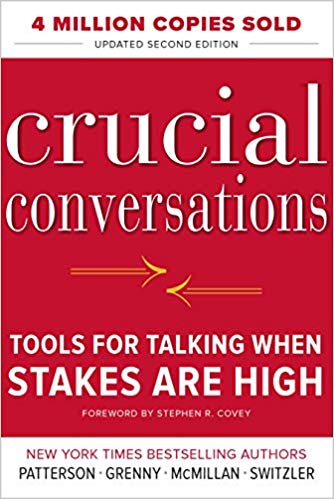

This article is an excerpt from the Shortform summary of "Crucial Conversations" by Kerry Patterson. Shortform has the world's best summaries of books you should be reading.
Like this article? Sign up for a free trial here .
What is the fool’s choice in Crucial Conversations? How do you avoid making a fool’s choice in crucial conversations?
A fool’s choice in crucial conversations refers to believing that you only have two bad choices in a conversation. Keep reading to learn how to avoid the fool’s choice in crucial conversations, and how to reframe your communication so you can make better choices.
What Is a Fool’s Choice in Crucial Conversations?
Many people make the Fool’s Choice in crucial conversations when they believe they have to make unpalatable either/or choices, for instance, 1) choose between telling the truth about a problem vs. 2) staying silent to preserve a relationship with a boss, coworker, or loved one.
Believing you have only two problematic alternatives to choose from is a fool’s choice. Crucial Conversations says there are always more alternatives.
We’ve all made the fool’s choice in crucial conversations to not say anything about issues with bosses, family, and friends. The consequences can be unfortunate: In the workplace, it can lead to terrible decisions; in personal relationships, it can create misery when partners are afraid to speak up.
Here’s an example of how employee silence can affect a company. The leaders of a company are planning to move its headquarters for flawed reasons. If the employees make a Crucial Conversations fool’s choice and fail to point out potential downsides for fear of retribution, company leaders will make a decision with harmful future consequences and waste money.
But there’s another option: A manager can speak up honestly and also preserve the relationship by using dialogue skills to be persuasive and respectful. If she succeeds the leadership may listen and revise the moving plans.
Dialogue Replaces the Fool’s Choice in Crucial Conversations
The key to successful conversations is getting all relevant information on the table.
When people express their opinions honestly, share their feelings, and articulate ideas — even if their ideas are controversial or unpopular — the result is dialogue, the free exchange of meaning or information.
Reject the Fool’s Choice: Crucial Conversations Can Help
Often when our adrenaline starts pumping, our brain function stalls and we feel forced to choose between only two bad alternatives. But this either/or belief gets us sidetracked and can kill dialogue.
For example, when a group of teachers met to discuss curriculum changes, one of them — an older, experienced teacher — digressed from the topic and rambled to the point that a younger teacher became frustrated and interrupted him rudely and offensively. The younger teacher made a Crucial Conversations fool’s choice — he was disrespectful because he thought his only choices were rudeness or not speaking up, thus allowing the unproductive conversation to continue.
But instead of focusing on only those two options, the young teacher should have set aside his emotions and asked himself what he wanted for himself and the relationship. He could have maintained his relationship with his older colleague, while also speaking up in a respectful way — helping the older man to clarify and focus his points, to add his meaning to the shared pool.
When you refuse the fool’s choice in crucial conversations at an emotional time, and return to the question of what you really want, your brain responds with better options. You can share your concerns, listen to others’ concerns, and build your relationship at the same time.
Give Yourself New Choices
You can refuse Crucial Conversations fool’s choices by coming up with new choices. You do this by going through a thought process that moves you from either/or to and. Here’s how it works.
- Reiterate what you really want. If you know what you want for yourself, others, and your relationship, you can avoid the fool’s choice in crucial conversations. For example, if your husband isn’t following through on commitments to you, you can state your desire as: I want my husband to be more reliable.
- State what you don’t want. What is the outcome you most want to avoid? For example, I don’t want to have an angry and useless conversation with my husband that creates bad feelings and doesn’t lead to change.
- Combine the two statements into an and question. For example, how can I have an honest conversation with my husband about being more dependable, and avoid creating bad feelings or wasting our time? When you ask yourself if you can accomplish both, you realize you can.
If you only believe you have a fool’s choice, crucial conversations can’t truly occur, and you’ll never reach an understanding or get what you want. You must first banish the idea of a fool’s choice in crucial conversations, and then you can move onto better and more productive communication.

———End of Preview———
Like what you just read? Read the rest of the world's best summary of Kerry Patterson's "Crucial Conversations" at Shortform .
Here's what you'll find in our full Crucial Conversations summary :
- How to approach an argument without getting mad
- The mistakes most people make when trying to listen to someone else
- How to come up with win-win solutions that make everyone happy






